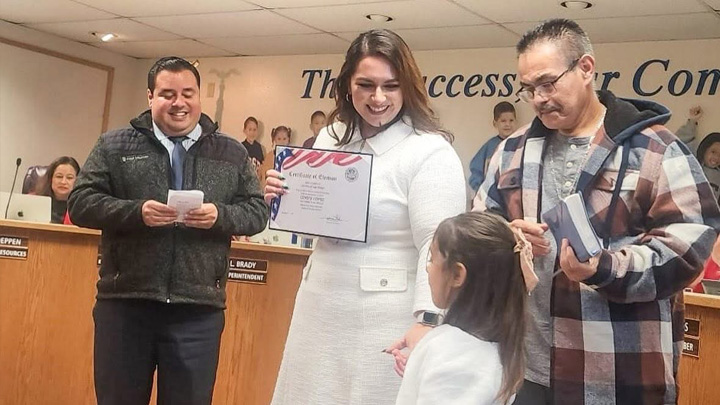Alumni Spotlight: Cindy López (’15, bilingual credential)

Former bilingual teacher Cindy López (’15, bilingual credential) has taken on a new calling in the field of education. Last Dec. 18, she was seated as a new member of the Governing Board of the National School District in National City, California.
As a member of the Board, she brings a teacher’s perspective to policymaking.
"Being in the classroom, you get to see how decisions made at the board level trickle down to your everyday experience working with students and families,” she said. “As a teacher, I always felt that our voices weren’t heard or understood by board members who maybe didn’t have experience in education.
“Four years ago, I ran for office during COVID. I came in second place, but it felt like a calling to run again.”
It paid off. Last Nov. 5, she was the leading vote-getter in a four-person race, garnering more than 30% of the vote.
López grew up as an English Language learner in San Diego’s City Heights community and spent seven years teaching in dual-language programs around San Diego with students kindergarten through fifth grade. The COE News Team recently caught up with López to discuss her foray into local politics, her somewhat painful election day and how her experience as a student in the SDSU Department of Dual Language and English Learner Education still shapes her outlook.
What was winning the election like for you?
“It was kind of eventful. I actually got bit by a dog while I was out flyering in the morning. I ended up going to urgent care the next day, but I was like, ‘I'm not going to leave the field.’ I was joyful and proud that we won. It was just a testament to the vision that I shared with voters while knocking on doors. It was gratifying to see they agreed with my vision for our students and what they could accomplish. I wouldn’t trade that day for anything — well, maybe not the dog bite.”
What’s been on your plate in your three months on the Board?
"As we’ve worked to create the budget for the next three years, my priority has been to ensure that those most needed services aren’t further cut from our students. Also, something in our district that we’ve seen is that we need more special education teachers to support our students. I think it’s important to create partnerships with SDSU and other local universities to have student teachers get to know our communities and their needs. I really want to have teachers stay here, to see a home here and to see a community here.”
Did your experience in the DLE program shape your views and goals as a policymaker?
“Yes, it did. I grew up during Prop 227 (a 1998 ballot proposition which outlawed bilingual education in California). I remember being in fourth grade and being told you can’t speak Spanish to your classmates or you can’t learn it. I saw students get punished for speaking in Spanish. They’d have their recess taken away or get a phone call home just for saying a word or two to a classmate. Back then, it made me feel that Spanish was not something I could speak to anyone. That connotation is still around in our communities — this idea that students can only speak English to be successful. What I know now is that when students learn their native language, they’re more likely to succeed and be more responsive to learning another language. What I really enjoyed about the DLE program experience was that it helped me teach the dual language perspective. I got to know the why and how to relate that to the community.”
Given your seven years of teaching experience, what advice would you offer future educators entering the profession?
“Definitely teach with love. I think we get so bombarded with our standards, with our expectations, with our lesson plans. But when you really approach it with love — and get immersed and embedded in the community — you’re really able to make that connection. Once you build that relationship with families and students, you can navigate the education part. Everything else just flows. Students want to be seen and heard. Sure they’re going to remember how to multiply, but those beautiful interactions are what they will remember most.”
This interview has been lightly edited for length and clarity.

